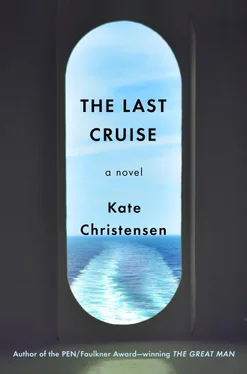Was his story really so boring? So inappropriate? All Mick had done was to put the dish into a personal context. It had taken less than a minute to tell. For the first time, instead of shame, he felt a hot tongue of rage. He hadn’t deserved that rebuke. He should have walked out proudly, unfazed, happy with the success of his dish. Instead, he’d felt crushed. And why? Because some Belgian prick’s ego couldn’t handle someone else stealing his spotlight for one measly second? What did it really matter?
He poked his flashlight into the dry-goods storage room to see what else he could salvage from the old cases of canned fruit cocktail, Spam, deviled ham, and Campbell’s cream soups, asparagus and mushroom and celery. Mick had no idea why most of this stuff was on board. Laurens had insisted that everything be made fresh, from scratch. Maybe the stores were meant to feed the crew, or to fulfill special requests from homesick American passengers who needed a room-service fix of the supermarket foods they were used to. Whatever the reason, Mick was glad to have it, even though much of it probably dated back to the Cold War. He hoped it wouldn’t give everyone botulism, because they would need all of it, starting now. Subtracting the norovirus victims, and counting the entire crew, including the walkouts, there were almost five hundred people on board to feed. Even the canned food wouldn’t hold out for long.
“Right in here,” he heard a familiar voice saying behind him. It was Consuelo. “I think there’s at least three cases.”
“Let’s take two of them,” came the French-accented voice of Jean-Luc. “It’s ours as much as theirs.”
“Hey,” Mick said, turning to flash his light on them. “What are you doing?”
Consuelo jumped a little. Her hair was loose, hanging in wild dark strings around her face, which was dark from the sun. Her arms looked sinewy and tensed for trouble. She wore a sweat-stained T-shirt and a pair of grubby trousers. “We’re running low on food,” she said. “We’re hungry. We need supplies.”
“And you were planning to just come in here and steal mine?”
“It belongs to everyone,” said Jean-Luc. He looked as disheveled as Consuelo. His scalp hadn’t been shaved in a while, and his short thick hair stood in a fluffy black skullcap, just beginning to curl. “We’re only taking Spam. Maybe some soup. The passengers, they don’t eat that shit, non ?”
“The passengers are going to have to eat that shit,” said Mick. “Starting tonight. Besides, there’s an airdrop coming.”
“Yeah right,” said Consuelo. “I don’t trust those pendejos. ”
The two rogue chefs faced him wordlessly, their hands hanging at their sides with incipient threat, their faces hard. Mick looked back at them, ready to take them on if he had to, but far from sure that he could. They inched closer to him, crowding him, forcing him back into the storage room. Jean-Luc picked up a case of Spam. Consuelo took one of soup and hefted it as if she were planning to throw it at him.
“I don’t want to fight you two for some stupid Spam,” said Mick, talking fast, holding his ground. “But you can’t steal from me. You should have asked me for it. Are we enemies? Why? I did nothing to you. The passengers, they did nothing to you. We’re all stuck here together. Why are you making this a war? Put those down. I mean it.”
Jean-Luc hefted his heavy box. “We are taking these and leaving those for you.”
Consuelo hesitated. Mick saw something in her face. Maybe she was remembering how he’d stuck up for her, treated her fairly. He decided to assume he had an opening and press it hard. He looked at her, ignoring Jean-Luc’s mouth-breathing hotheadedness, and said, “We’re all stuck out here in the middle of the ocean, and we’re running out of food. Can we pool our resources instead of fighting over them? Let’s work together, this is stupid.”
Consuelo said nothing. She turned and walked out with her box of cream of celery soup. Jean-Luc followed behind her with his box of Spam, and Mick was alone again. He turned off his flashlight and stood in the dark. He wasn’t even mad. He felt nothing, in fact. All those years, every day, he had hurled himself into the kitchen at dawn, gone sleepless on the night crew, worked long extra hours without overtime pay, just for the private, dumb satisfaction of flaying himself on the wheel of the mill. He’d seen it as a badge of honor, an accomplishment of will and dedication. He’d believed, stupidly, that he’d be rewarded for it. He’d assumed that there was a point to it, that it would lead somewhere better. Now the whole idea seemed like the punch line to an unfunny cosmic joke on Mick.
The Isabella moaned, deep in her belly, somewhere just below his feet: an eerie, prolonged, echoing underwater squeal. It sounded to him like friction and torque between her ribs and her keel, straining at her bolts in different directions, as she rocked gently in the shallow swells. He could feel rumblings along with the noises, the tremors of her discomfort, as if she were waking up from a long deep sleep to discover she was in pain.
As the high noon sun slanted into the early afternoon, Christine found herself perched on a plush armchair in a big suite on the bridge deck, drinking warm vodka and cranberry juice from a plastic cup and looking up at a framed photo of an astonishingly young-looking Richard Nixon. He had stayed in the suite during a Mediterranean cruise back in the 1970s—before anyone in the room was born, Christine realized—and it had subsequently been decorated in his honor and nicknamed, somewhat ironically she thought, the Nixon Suite. The photograph of Nixon felt like a sly wink. His vilified face looked weary and harmless and almost avuncular now.
Currently occupied by Cynthia Perez, the Mouseketeer turned movie star, it had become the daily hangout spot for the younger passengers. The large living room felt crowded with soft, bright, sweaty faces. A pile of people had deposited themselves on the two enormous beds among many upholstered green-and-gold tasseled pillows, several more were curled into the white space-age chairs and the harvest-gold armchairs and love seats, and the rest of them sprawled on the beige and brown geometric-patterned rugs. They looked charmingly out of place to Christine amid the shabbily futuristic decor. The built-ins were scuffed teak, Danish modern. The kitchenette could have been a set in a 1970s sci-fi movie.
“Why can’t we scientifically quantify the soul?” Tye, the Yale historian, was saying, apropos of a hypothetical discussion about death that had been going on to Christine’s right. “If we can get to the level of quantum mechanics, if we can identify a quark, why can’t we figure out what the hell those twenty-one grams are ?”
“They’re energy,” said Tameesha, the singer. “The soul is energy. It goes straight back into the universe when we die.”
“But what kind of energy?”
“I read a thing on Huff Po, ” said Allison, the young piano prodigy. “It said the soul is like our software.”
“I read a thing about how we’re all just living in a computer simulation,” said Matt, the dreadlocked, pudgy trombonist for the Kool-Tones. His skin was thick with sweat. He held a ukulele against his large stomach. “It’s a supercool idea. I kind of buy it. A British philosopher came up with it. He says there’s a fifty percent chance it’s true.”
“Right,” said Allison. She looked excited. “I saw that too. The designers of the simulation are supposed to be, like, thirteen-year-olds in a basement playing a random virtual reality game after school in the future.”
Читать дальше












